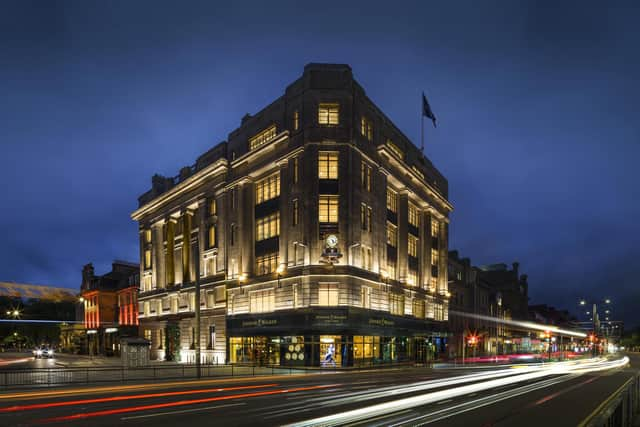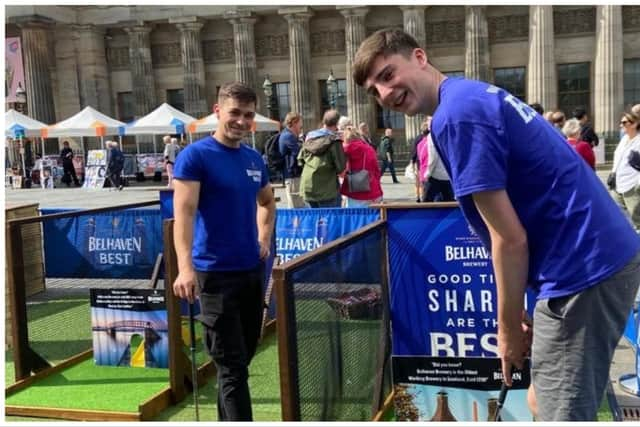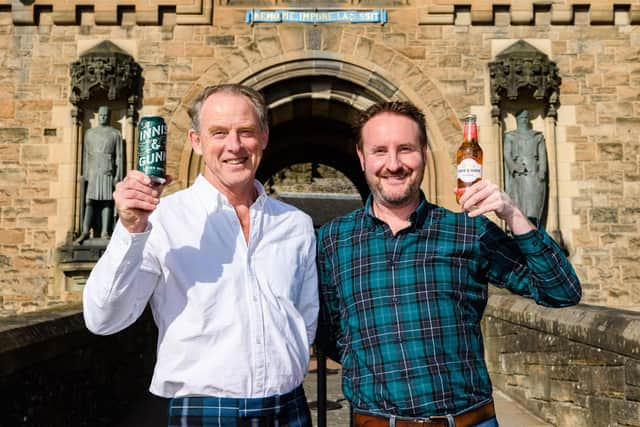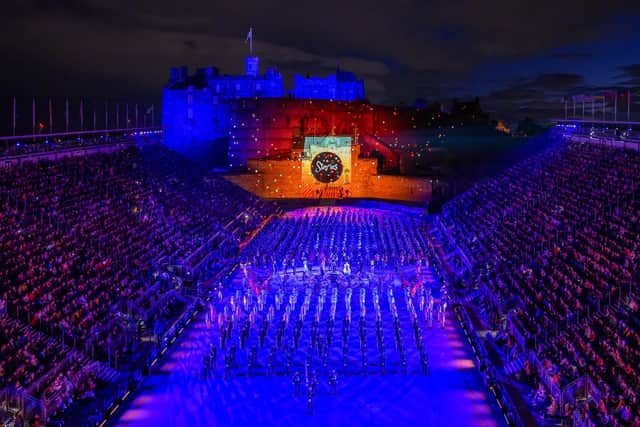Exclusive:Alcohol advertising ban plans have had 'chilling effect' on potential sponsors of Edinburgh's festivals, boss claims
and live on Freeview channel 276
Festivals and arts events fear potential sponsors are already running scared as the Scottish Government is set to revisit plans to ban alcohol advertising and marketing.
Proposals put out for consultation have prompted umbrella body Festivals Edinburgh to warn that the city’s major events are facing “death by a thousand cuts” due to the importance of commercial partnerships with drinks brands.
Advertisement
Hide AdAdvertisement
Hide AdDirector Julia Amour said: “The consideration of restrictions to alcohol events sponsorship has already had a chilling effect on the sponsorship sector, with two of our member festivals reporting that conversations with potential sponsors have been negatively affected.”


Festivals Edinburgh - which works with the organisers of events like the Edinburgh International Festival, the Fringe, the Tattoo and the city’s celebrations of visual art, film and literature - claims new curbs on alcohol sponsorship could create a “cliff edge” for their future finances and stability.
First Minister Humza Yousaf pledged that the plans would go “back to the drawing board” shortly after he took over from Nicola Sturgeon in the spring.
In his first Programme for Government last month, Mr Yousaf promised a full review of the consultation responses will be published by the end of 2023.
Advertisement
Hide AdAdvertisement
Hide AdA leading alcohol harm reduction charity is pressing for the proposed restrictions to be revisited “as a matter of absolute urgency to protect public health”.


Scottish Health Action on Alcohol Problems (SHAAP) chair Dr Alastair MacGilchrist said: “SHAAP are calling for the introduction of a comprehensive set of marketing restrictions around alcohol promotion in sporting events, in public spaces, in the retail environment, online and through TV, radio and print advertising. The Scottish Government should revisit their proposals.”
Speaking in the Scottish Parliament last month, Mr Yousaf said: “We will always support jobs and the economy, we will also work with the industry where appropriate, but be in no doubt we will take further action to reduce alcohol harm and particularly to protect children from its ill-effects.”
However, the effects of the proposals have already been felt by some event organisers.
Advertisement
Hide AdAdvertisement
Hide AdFestivals Edinburgh has warned the government that the prospect of the restrictions is “extremely problematic” with organisers already struggling balance their budgets.


Its report for the Government describes the events sector in Scotland as being in an “extremely fragile and perilous state” due to the impact of prolonged standstill funding, reduced audiences since the pandemic and the cost-of-living crisis.
Some alcohol sponsorships are currently said to contribute to up to 10 per cent of event budgets.
In evidence to Holyrood's culture committee, Francesca Hegyi, chief executive of the International Festival, said: "One of the unintended consequences of such legislation would be the disappearance of alcohol sponsorship from the arts and culture sector. That sponsorship is another plank of our funding.
Advertisement
Hide AdAdvertisement
Hide Ad“We hugely rely on that form of sponsorship because of the nature of the entertainment industry that we reside in. Joined-up thinking about the implications of policy decisions and movements would be really welcome.”


The original consultation admitted there had been no research into the “extent and impact” of alcohol sponsorship of non-sporting events in Scotland.
However, it added: “It seems likely that children and young people, as well as those in recovery, see examples of alcohol marketing at non-sporting events, as a result of sponsorship arrangements. Techniques are likely to mirror those used in sports sponsorship, including alcohol branding being featured on stages at music festivals and shows, alcohol advertising being displayed on programmes and posters, and online content.
“It could be that sponsorship of non-sporting events also allows alcohol brands to feature alongside fun and enjoyable activities. This could drive the visibility and appeal of alcohol, and influence pro-alcohol attitudes in children and young people.
Advertisement
Hide AdAdvertisement
Hide Ad“There is some academic evidence finding that those on a recovery journey for problematic drinking find places where alcohol is sold and promoted to be risky environments they would rather avoid.”
The wide-ranging concerns have been raised by Edinburgh’s festivals months after Scotland’s biggest live music promoter, DF Concerts, warned a ban would be “nothing short of disastrous”, as it would lead to the widespread closure of venues, the loss of major events and an exodus of audiences to England. Peter Duthie, the chief executive of Glasgow’s Hydro arena, said the restrictions would threaten the industry’s future viability and affect the country’s “attractiveness” as a major event host.
The Fringe, which was sponsored by Belhaven Brewery, Johnnie Walker and Edinburgh Gin this year, and the Tattoo, which was backed by Innis & Gunn, Pickering’s Gin and whisky brand Benriach, were specifically named in the Government consultation.


Ms Amour said: “The events landscape in Scotland is of great international appeal, but its core benefit, first and foremost, is to the mental, cultural and physical health of our local populations. However, the events sector is today in an extremely fragile and perilous state.
Advertisement
Hide AdAdvertisement
Hide Ad“The sponsorship sector in Scotland is not blessed with major players and many of these are already contracting, whether due to environmental concerns with the oil and gas industry, or mergers and buy-outs in the financial sector reducing budgets and decision-making centres in Scotland.
“One of the only major sectors left to work with on sponsorship matters seems to be the alcohol industry. As with many in our festivals sector, the income contribution to overall budget from the alcohol industry is on a continuum from two to ten per cent.
“Although this might seem like a modest contribution, it needs to be seen in the context of the wider funding environment. A prohibition on alcohol events sponsorship might see festivals and events suffer death by a thousand cuts.”
Ms Amour pointed out that many sponsorship arrangements ran over several years, which helped events to have a degree of financial security and allow them to strategically plan ahead.
Advertisement
Hide AdAdvertisement
Hide AdShe said: “The immediate introduction of sponsorship restrictions could create a cliff edge for organisational finance and stability, and thus, at the very least, all such multi-year arrangements should be allowed to run through to their contractual conclusion.
"The consideration of restrictions to alcohol events sponsorship has already had a chilling effect on the sponsorship sector, with two of our member festivals reporting that conversations with potential sponsors have been negatively affected.
"Edinburgh’s festivals are not driven by a profit motive but rather are about enhancing people’s health and wellbeing through a greater cultural offering. We act positively and responsibly in all aspects of our work, and expect our partners and sponsors to act in a similar manner.
"A prohibition on alcohol events sponsorship might have the unintended consequence of negatively affecting people’s mental, physical and cultural health through the curtailing of cultural activity.”
Advertisement
Hide AdAdvertisement
Hide AdThe International Festival, which was sponsored by Springbank whisky this year, has told the Government it is “acutely aware” of its intention to either limit or end alcohol advertising and sponsorship around events, warning the move would cause “significant and irreversible harm to the events, culture and creative industries sectors”.
Ms Amour insisted the festivals were aware that alcohol misuse was a “serious problem” and supported legislation to deal with the issue, particularly for children and young people.
However, she added: “These proposals seem to start from the premise that alcohol is the problem, rather than misuse of alcohol, and as such are aimed at the general population rather than being more effectively targeted.
"We would suggest alcohol sponsorship should be prohibited at events where the majority of participants or competitors are children, and/or where the audience or spectator profile is dominated by those aged under 18.”
The Scottish Government has been contacted for comment.
Comment Guidelines
National World encourages reader discussion on our stories. User feedback, insights and back-and-forth exchanges add a rich layer of context to reporting. Please review our Community Guidelines before commenting.
